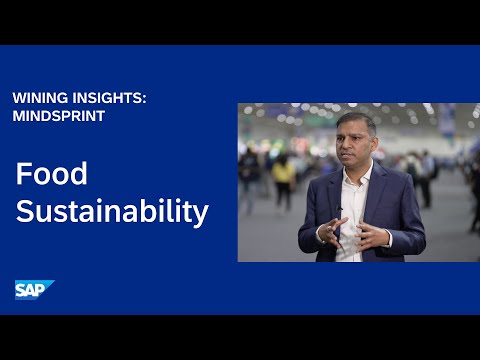We don't often think about how cutting-edge technology helps get fresh produce to the grocery store or to our doorstep, but agritech company Mindsprint is trying to do just that, with a parent company on a mission to reimagine the entire food supply chain.
Agritech, or agricultural technology, aims to use technology to improve farm yields and efficiency, and Mindsprint is helping its clients with sustainable digital transformation. The Singapore-based technology and business services company's services include digital transformation, cyber security and more, requiring a robust environment.
“We've now added almost every product from SAP to our environment,” says Amit Jain, senior vice president and head of SAP at Mindsprint. That includes migrating to SAP S/4HANA, running SAP SuccessFactors solutions, SAP Concur solutions, SAP Integrated Business Planning for Supply Chain and more. “We're working very closely with SAP, not just on the product side, but on the services side as well.”
This has enabled Mindsprint to stay agile and continue to serve its customers, and their customers, as market demands change.
Transparency for all
“People aren't going to stores anymore,” Jain said. “They want to order everything online.”
Lead the way with SAP S/4HANA Cloud
COVID-19 has accelerated this change, spawning food startups and other e-commerce sites, Jain said. And Mindsprint is using its logistics, financial and manufacturing solutions within SAP S/4HANA to help these customers meet growing online demand and add transparency to their processes.
“When we talk about the food supply chain, people want to be sure that the food they're eating is good – they can trace where their food comes from,” Jain said.
To that end, Mindsprint is also using SAP to improve transportation management at every stage of food travel, from farm to port to consumer, Jain says. And SAP Extended Warehouse Management plays a key role in between trips, because different foods have different temperature and other requirements.
Technology-Driven Conservation
“SAP remains at the core of everything we do, but we are also leveraging other technologies such as blockchain,” Jain said. “Blockchain helps us trace the supply chain of our products end-to-end.”
Jain said MindSprint uses sensors not only on its farms but also in its products, including in the company's large palm plantations, where farmers can monitor the health of leaves, helping to conserve resources and prevent rot.
“Using this technology, we can track each palm tree in a plantation and tell which ones are green and which ones are yellow,” Jain says, “so we can remove the yellow ones before they rot.” The dangerous change from a healthy green to a diseased yellow or brown can happen in just a few days.
These agricultural sensors could also help farmers better allocate water to specific fields or individual plants that need it and avoid watering what doesn't, improving crops and yields, Jain noted, and helping to conserve resources that are very scarce and valuable in some areas.
“This also helps conserve water,” Jain says. “Every drop saved counts.”
Track it all
Jain said the agritech industry is heavily focused on the supply chain, and that's where Olam and Mindsprint see the greatest benefit from SAP technology.
“We're able to optimize our supply chain and we can track everything we do,” Jain said. “That's helped us save a lot of money.” Jain said the technology is also helping MindSprint make more sustainable choices, improve transportation and select the right logistics partners.
“All these decisions are made using SAP,” Jain says.

To stay up to date on the latest SAP news, follow us on LinkedIn.



